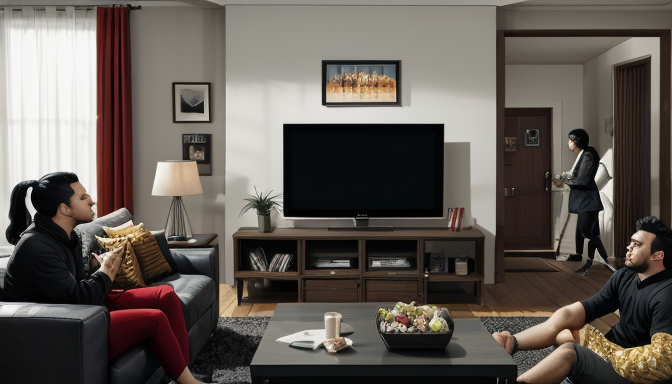Reality TV has taken the world by storm, and it’s not hard to see why! With its unique blend of drama, emotion, and a sprinkle of surprise, these shows captivate audiences like nothing else. Have you ever found yourself glued to the screen, wondering what will happen next? That’s the magic of reality television! It taps into our innate desire for escapism, allowing us to step into someone else’s shoes and experience their highs and lows without any real-life consequences.
Moreover, reality TV often mirrors our own lives, showcasing relatable struggles and triumphs. This connection fosters a sense of community among viewers, who eagerly discuss episodes on social media platforms. The dramatic storylines and character arcs keep us emotionally invested, making it feel like we’re cheering for friends rather than strangers on a screen. So, whether it’s the thrill of competition, the joy of unexpected alliances, or the heartbreak of betrayal, reality TV offers a rollercoaster of emotions that keeps us coming back for more!
The Psychology Behind Reality TV
Understanding the psychological appeal of reality TV reveals why viewers are irresistibly drawn to these programs. At the heart of this phenomenon is the desire for escapism. After a long day, who wouldn’t want to dive into a world where drama unfolds and conflicts arise? It’s like taking a roller coaster ride from the comfort of your couch!
Moreover, reality TV taps into our innate tendency for social comparison. We can’t help but measure our lives against those we see on screen. This comparison often leads to feelings of validation or even superiority, as we see contestants navigate their challenges, sometimes making choices that seem downright ridiculous. It’s a guilty pleasure that keeps us glued to our screens.
Additionally, the emotional engagement these shows foster is remarkable. Viewers find themselves rooting for their favorite contestants, experiencing joy, heartbreak, and everything in between. As we witness their journey, we can’t help but feel a sense of connection. This emotional investment is what keeps us coming back for more, as we become part of their story, eagerly anticipating the next twist in the tale.

The Role of Dramatic Storylines
Dramatic storylines are the lifeblood of reality TV, acting like a magnet that pulls viewers in. Think about it: when you tune in, you’re not just watching people live their lives; you’re diving headfirst into a whirlwind of conflict, tension, and unexpected twists. These narratives often reflect real-life struggles, making them relatable and engaging. Viewers can’t help but feel a connection to the characters as they navigate their ups and downs, much like a rollercoaster ride that keeps you on the edge of your seat.
In reality TV, the stakes are high, and the drama is palpable. Each episode unfolds like a chapter in a gripping novel, filled with cliffhangers that leave you craving more. Just consider how a sudden betrayal or a heartfelt confession can shift the entire dynamic of a show. It’s these moments that not only enhance emotional investment but also spark conversations long after the credits roll.
Moreover, the unpredictability of these storylines is what truly sets reality TV apart. You never know when a surprise twist will turn everything upside down, prompting viewers to keep watching. This element of surprise fosters a sense of anticipation, making it impossible to look away. In essence, dramatic storylines are not just entertaining; they are the very fabric that weaves audiences into the reality TV experience.
Character development in reality TV is like a rollercoaster ride that keeps viewers strapped in for the thrill. As contestants face challenges, their personalities unfold in real-time, allowing audiences to witness their triumphs and tribulations. This journey fosters a deep emotional connection between the viewers and the characters, making it feel as if we’re cheering for our friends rather than just watching a show. Have you ever found yourself rooting for a contestant as if their success was your own? That’s the magic of character development!
Moreover, the struggles and growth of these individuals resonate with our own experiences. When a contestant overcomes a hurdle, it’s not just their victory; it feels like a shared win. This connection is reinforced through various elements:
- Relatable Struggles: Viewers see their own challenges reflected in the contestants’ journeys.
- Personal Backstories: Understanding where a contestant comes from adds depth and relatability.
- Transformation Arcs: Witnessing growth and change keeps audiences invested.
In essence, character development is the heartbeat of reality TV, creating a bond that keeps us coming back for more. It’s not just about the drama; it’s about feeling connected to the stories unfolding before our eyes.
One of the most thrilling aspects of reality TV is its inherent unpredictability. Each episode is like a rollercoaster ride, where viewers are kept guessing about what will happen next. This suspense is a key ingredient that hooks audiences, making them return week after week. Imagine tuning in, only to find out that a beloved contestant has been eliminated or that a shocking twist has turned the game on its head!
The surprise elements in these shows often come from unexpected alliances, dramatic confrontations, or sudden changes in the competition rules. These twists not only enhance the drama but also create a sense of urgency; viewers feel compelled to watch every episode to catch all the action. To illustrate this point, consider the following:
| Surprise Element | Impact on Viewers |
|---|---|
| Unexpected Eliminations | Heightened Emotional Investment |
| Shocking Alliances | Increased Engagement and Discussion |
| Last-Minute Rule Changes | Enhanced Anticipation for Future Episodes |
These surprises create a dynamic viewing experience, transforming passive viewers into active participants who speculate and discuss outcomes. The thrill of not knowing what’s around the corner keeps audiences on the edge of their seats, eagerly awaiting the next episode. In this way, unpredictability not only entertains but also fosters a sense of community among fans, as they share their predictions and reactions on social media platforms.
One of the most captivating aspects of reality TV is its knack for delivering resolution at the end of each episode. This structure not only provides a satisfying conclusion to the narrative arc but also creates a compelling reason for viewers to return week after week. Think of it like a good book that leaves you hanging at the end of a chapter, making you eager to dive into the next one. Each episode often wraps up with a decisive moment, whether it’s a contestant being eliminated, a couple deciding to stay together, or a dramatic revelation that changes everything.
This sense of closure can be incredibly rewarding for audiences. It gives them a feeling of completion and allows them to process the events that unfolded. Furthermore, this episodic format fosters a routine, making it easy for viewers to anticipate and schedule their viewing time. The thrill of waiting for the next episode to see how unresolved tensions will be addressed keeps fans glued to their screens. In essence, reality TV masterfully combines drama with resolution, ensuring that each episode feels like a mini-event in itself.
In today’s digital age, social media has transformed the way we engage with reality TV. It’s not just about watching anymore; it’s about experiencing the drama in real time. Platforms like Twitter, Instagram, and TikTok have become extensions of the shows, allowing fans to interact and share their thoughts instantly. Have you ever found yourself scrolling through your feed, seeing your friends’ reactions to the latest episode? That’s the power of social media!
Moreover, social media creates a community around these shows. Fans can join discussions, share memes, and even follow their favorite contestants, making them feel closer to the action. This connection fosters a sense of belonging, as viewers bond over shared opinions and dramatic moments. Think about it: when a contestant faces a tough challenge, fans rally together online, creating a support network that enhances their viewing experience.
Additionally, reality TV stars often leverage social media to build their brands, leading to a new kind of celebrity. They engage with fans, share behind-the-scenes content, and even participate in live Q&A sessions, providing an intimate glimpse into their lives. This interaction not only boosts their popularity but also keeps audiences coming back for more. It’s a fascinating cycle of engagement that keeps the excitement alive long after the credits roll!
Reality TV is not just a form of entertainment; it acts as a mirror reflecting and shaping our cultural landscape. Shows like The Real Housewives and Survivor have become cultural phenomena, influencing everything from fashion to social behavior. Have you ever noticed how a popular show can spark new trends? For example, the fashion choices of contestants often lead to a surge in similar styles among viewers, creating a ripple effect in the fashion industry.
Moreover, reality TV often introduces and popularizes new social norms. It challenges traditional values and encourages discussions around topics like relationships, identity, and lifestyle choices. As audiences engage with these narratives, they begin to adopt new perspectives, making reality television a powerful agent of change.
In addition, the genre has a unique ability to localize content while maintaining its global appeal. Shows are adapted to resonate with local cultures, ensuring that they remain relevant. This adaptability not only broadens the audience reach but also fosters a sense of community among fans worldwide.
In essence, reality TV serves as a cultural touchstone, influencing trends and shaping societal norms while keeping viewers engaged and connected. Isn’t it fascinating how a simple show can have such a profound impact on our lives?
Over the years, reality TV has transformed dramatically, evolving from simple, candid camera-style shows to complex narratives that captivate millions. Initially, programs like “Survivor” and “Big Brother” defined the genre, showcasing competition in extreme conditions. These shows set the stage for a new form of entertainment that blurred the lines between reality and scripted drama.
As audiences craved more variety, formats diversified. Today, we see a mix of competition-based shows, lifestyle series, and docuseries that delve into the lives of ordinary people. For instance, “The Real Housewives” franchise showcases affluent lifestyles, while shows like “Queer Eye” focus on personal transformation and emotional connections. Each format caters to different viewer preferences, ensuring that there’s something for everyone.
The rise of streaming platforms has further accelerated this evolution. With the ability to binge-watch entire seasons, viewers can engage deeply with characters and storylines. This change has led to the creation of niche reality shows, such as “Nailed It!“, which combines humor and culinary challenges, appealing to a broader audience.
In summary, the evolution of reality TV formats reflects changing cultural trends and viewer demands. As the genre continues to adapt, one thing remains clear: reality TV is here to stay, constantly reinventing itself to keep us entertained.
Reality TV has a remarkable ability to transcend cultural boundaries, making it a global phenomenon. Its universal themes—like love, competition, and conflict—resonate with audiences everywhere. But what truly sets reality TV apart is its knack for localization. Producers adapt popular formats to reflect the unique tastes, values, and social norms of different cultures. This means that while a show might start in the U.S., it can find new life in countries like India, Brazil, or Japan, each with its own twist on the original concept.
For example, consider the format of a competitive cooking show. In the U.S., it might focus on gourmet cuisine, while in Italy, it could emphasize traditional family recipes. This adaptability allows reality TV to maintain its relevance and appeal across diverse audiences.
This localization not only caters to local preferences but also fosters a sense of community among viewers. Fans can discuss their favorite contestants, share memes, and even engage in debates on social media platforms, creating a rich tapestry of cultural exchange. In this way, reality TV doesn’t just entertain; it connects people from all walks of life, proving that sometimes, the drama of reality is a language everyone can understand.
Frequently Asked Questions
- What makes reality TV so appealing?Reality TV captivates audiences by offering a mix of drama, real-life situations, and relatable characters. It provides an escape from everyday life while allowing viewers to connect emotionally with the contestants.
- How do social media platforms influence reality TV?Social media amplifies the reality TV experience by enabling fans to engage with their favorite shows and contestants. This interaction creates a sense of community, enhancing viewer loyalty and excitement.
- Why do viewers enjoy the unpredictability of reality TV?The element of surprise in reality TV keeps viewers on the edge of their seats. Unexpected twists and turns make each episode thrilling, encouraging fans to tune in week after week to see what happens next.

